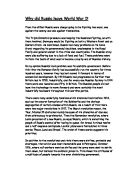After the slogan was introduced, many people realised that is was what they wanted because the provisional government wasn’t delivering it. Over the summer of 1917, more and more people were becoming opposed to the war and this was mainly due to the shortages of resources and food that the war was bringing. When Kerensky launched his major attack on the Germans in July 1917, an enormous demonstration in Petrograd occurred because they were defeated miserably. These protests were called the “July days”, and consisted of nearly all members of society; sailors, soldiers and workers, all pouring on to the streets in protest of the war. The mutineers turned to the Bolsheviks, the only peace wanting party, to lead them in protest, and they did.
In return, Kerensky appointed a new General, Kornilov, to lead the army in the war. Now that Kornilov controlled the army, he tried to stop the protests by charging his Cossacks at Petrograd. Kerensky begged the Bolsheviks to help as they had control over the Red Army. They agreed and, although Kornilov’s Cossacks never reached Petrograd, the Bolsheviks were seen to be the saviours and this increased their popularity by millions and ultimately helped them to gain control.
When they did take control in November 1917, Lenin had to do what he had promised so sent Trotsky to Germany to negotiate a cease-fire. This must be one of the main reasons why they exited the war.
Another reason was the starvation of the Russian people. Food wasn’t getting through the major towns and cities and people were starving. When the Bolsheviks introduced the slogan, “Bread, Peace and Land,” they realised that they were the way forward. This increased the Bolsheviks support, which intern bought them to power.
Kerensky wasn’t a very good army General, so he didn’t really know what to do with his army. He tried a large-scale attack but was beaten back maliciously by the Germans, and it just wasn’t going well over all for him. On top of that the army weren’t very well equipped, with one gun being shared between three to five men. They were desperately running out of resources and didn’t seem to be winning the battles so why not just quite the war and start re-building. This could have been a very large factor in the decision to exit the war. As soon as the Bolsheviks got into power, this is exactly what they did. Lenin sent Trotsky to negotiate a peace treaty with the Germans.
So why did Russia exit the world war early? I think the main reason was the Bolsheviks getting into power because of all the political parties, they were the only party that wanted peace and without them, the provisional government would have bought the country into turmoil. The other less important reasons also tied in with these. They were the populations dismay at the war, the starvation of many millions of people in Russia, and the fact that they weren’t getting anywhere from the war and were running out of resources.







